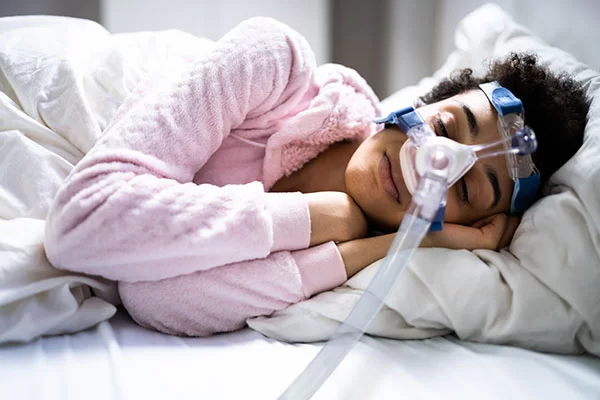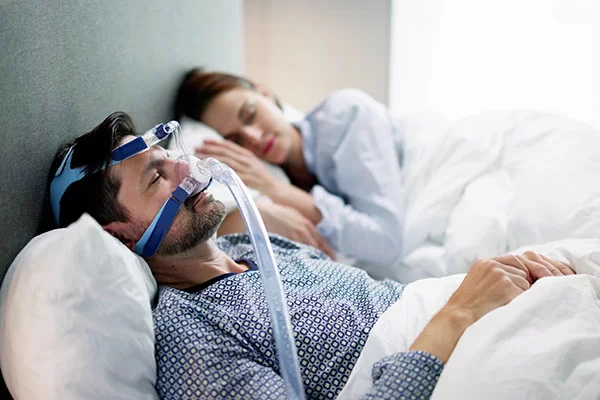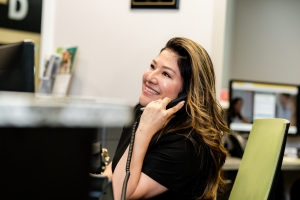Please note we may not offer this treatment at our office. Contact (614) 771-6060 for more information.
Your Path to Restoring Sleep
Sleep apnea is a common sleep disorder that affects millions of people worldwide. If you or a loved one in Hilliard, OH, has been diagnosed with sleep apnea, it’s essential to explore effective treatment options to improve sleep quality and overall health.
At Fishinger Dental, Dr. Nathan Desai wants our patients to be knowledgeable about how CPAP (continuous positive airway pressure) aids in easing their sleep apnea and restoring their quality of life. Contact our dental office today by calling (614) 771-6060 to schedule an appointment and start your path to better sleep.
Types of Sleep Apnea
Sleep apnea involves pauses in breathing or shallow breaths during sleep. There are two common types:
- Obstructive Sleep Apnea (OSA): The most common type, occurring when the muscles at the back of the throat relax excessively during sleep, leading to airway blockages. This may result in symptoms such as loud snoring and gasping for air.
- Central Sleep Apnea (CSA): Caused by the brain failing to send proper signals to muscles controlling breathing. Unlike OSA, CSA does not involve airway obstructions.
What Is CPAP?
Continuous Positive Airway Pressure (CPAP) therapy is the gold standard for treating obstructive sleep apnea. CPAP machines deliver a continuous stream of pressurized air through a mask, keeping the airway open and preventing breathing interruptions. This allows for uninterrupted, deep sleep throughout the night.
Dr. Desai may recommend CPAP therapy to reduce symptoms and improve overall sleep quality, helping patients avoid issues like daytime sleepiness, headaches, and long-term health risks such as high blood pressure and heart disease.
How Does CPAP Work?
CPAP therapy consists of three components:
- CPAP machine: Generates pressurized air.
- Mask: Secured over the nose, mouth, or both, creating a seal for air delivery.
- Tubing: Connects the mask to the machine for a continuous flow of air.
The pressurized air from the CPAP machine acts as a pneumatic splint, preventing airway collapse. It’s crucial to ensure a properly fitting CPAP mask for maximum comfort and therapy effectiveness. Different mask options are available, including nasal masks, nasal pillows, and full-face masks.
Benefits of CPAP Therapy
CPAP therapy can provide patients with various benefits, including:
- Improved sleep quality: By ensuring a steady flow of oxygen and preventing apneas (breathing interruptions), CPAP users can enjoy more restful and uninterrupted sleep.
- Reduced daytime fatigue: Effective CPAP therapy can alleviate daytime fatigue and excessive daytime sleepiness, which are common symptoms of sleep apnea. With better sleep, individuals can feel more alert and focused during the day.
- Lower risk of health complications: Untreated sleep apnea can lead to serious health issues such as hypertension, heart disease, stroke, and diabetes. CPAP therapy helps reduce the risk of these complications by maintaining proper oxygen levels during sleep.
- Enhanced quality of life: By addressing sleep apnea symptoms and improving overall health, CPAP therapy can enhance an individual’s quality of life. Patients often report feeling more energetic, productive, and emotionally stable.
Types of CPAP Machines and Masks
CPAP Machines
The different types of CPAP machines include:
- Standard CPAP: Provides a fixed pressure level.
- Auto CPAP (APAP): Adjusts pressure based on the user’s needs during the night.
- BiPAP (Bilevel positive airway pressure): Offers different pressures for inhalation and exhalation, suitable for certain respiratory conditions.
CPAP Masks
CPAP masks come in various styles:
- Nasal masks: Covers the nose
- Full-face masks: Covers both the nose and mouth
- Nasal pillow masks: Rests under the nostrils
- Hybrid masks: Combines features of nasal and full-face masks
Choosing the right CPAP machine and mask can make all the difference in achieving effective treatment. Dr. Desai will work with you to ensure a comfortable fit.
Our CPAP Tips
CPAP Proper Maintenance
To keep your CPAP machine in good condition, follow these instructions:
- Clean the CPAP components regularly to prevent bacterial growth.
- Replace mask cushions, filters, and tubing as recommended by the manufacturer.
- Keep the CPAP machine in a clean and dust-free environment.
Consistent Usage
To get the best results from CPAP therapy, you’ll want to do the following:
- Use the CPAP machine every time you sleep, including naps.
- Stay consistent with your prescribed pressure settings.
- Traveling with CPAP is manageable, and portable machines are available. Don’t leave the CPAP behind.
Adjusting to CPAP
Some patients may experience initial discomfort when getting started with using a CPAP machine. We recommend gradually increasing usage time to adapt. Make sure to discuss any issues or discomfort with your healthcare provider for adjustments.
How Do You Know If You Need a CPAP Machine?
You may need a CPAP machine if you have sleep apnea or another type of sleep disorder. Common signs of sleep apnea include:
- Loud Snoring
- Witnessed Apneas
- Excessive Daytime Sleepiness
- Morning Headaches
- Frequent Nighttime Awakening
- Difficulty Concentrating
- Mood Changes
- High Blood Pressure
- Obesity or Excess Weight
- Large Neck Circumference
- Family History
If you recognize several of these signs and symptoms in yourself or if someone you trust has observed these patterns during your sleep, contact a healthcare professional. Remember that self-diagnosis isn’t advisable.
Once you have a proper diagnosis, our Hilliard dentist will discuss treatment, which may include CPAP machines.
CPAP Alternatives
Many may find that CPAP isn’t the best option. Luckily, many CPAP alternatives are available that our Hilliard dentist may recommend:
- Oral Appliance Therapy
- BiPAP Machine
- Surgery
- Lifestyle Changes
- Mouth and Throat Exercises
- Positional Therapy
Insurance and Cost of CPAP Therapy
The cost of CPAP therapy can vary depending on the type of CPAP machine, mask, and additional equipment required. Most CPAP machines range in price from $500 to $3,000, while masks and accessories can add an extra $100 to $300. However, many health insurance plans, including Medicare and Medicaid, often cover CPAP machines, masks, and related supplies if you have a documented diagnosis of obstructive sleep apnea (OSA).
To determine coverage, you will typically need to undergo a sleep study and receive a prescription from a healthcare provider for the CPAP machine. Insurance plans may require you to rent the equipment initially, with the option to purchase it after a certain period, provided that you demonstrate consistent use and compliance with treatment.
It’s essential to check with your insurance provider to understand what is covered under your plan.
Frequently Asked Questions
Can CPAP therapy cure sleep apnea?
No, CPAP therapy doesn’t cure sleep apnea, but it effectively manages the condition. Consistently using CPAP treatment as prescribed can lead to a significant reduction in symptoms and improved sleep quality for individuals with sleep apnea.
Is CPAP therapy uncomfortable?
Initially, some individuals may find CPAP therapy uncomfortable, especially when adjusting to the airflow and wearing the mask. However, with time and proper mask fitting, most people adapt well to the therapy and find it increasingly comfortable.
Can I travel with my CPAP machine?
Yes, most CPAP machines are designed to be portable and travel-friendly. Ensure you pack your CPAP machine and accessories securely, and consider bringing extra supplies for uninterrupted therapy while traveling.
How can I maintain and clean my CPAP equipment?
Regular cleaning of CPAP equipment is crucial to prevent bacteria buildup. Follow the manufacturer’s instructions for cleaning the mask, tubing, and humidifier. Cleaning with mild, fragrance-free soap and water is recommended. Maintain proper cleaning practices and replace components as needed to ensure optimal therapy effectiveness and hygiene.
Sleep Soundly and Breathe Freely
Don’t let sleep apnea continue to affect your life. Contact us at (614) 771-6060 today to schedule your consultation and learn more about CPAP therapy or alternative sleep apnea treatments. We proudly serve patients from Columbus, Dublin, Upper Arlington, Grove City, Westerville, and nearby communities in Ohio.








